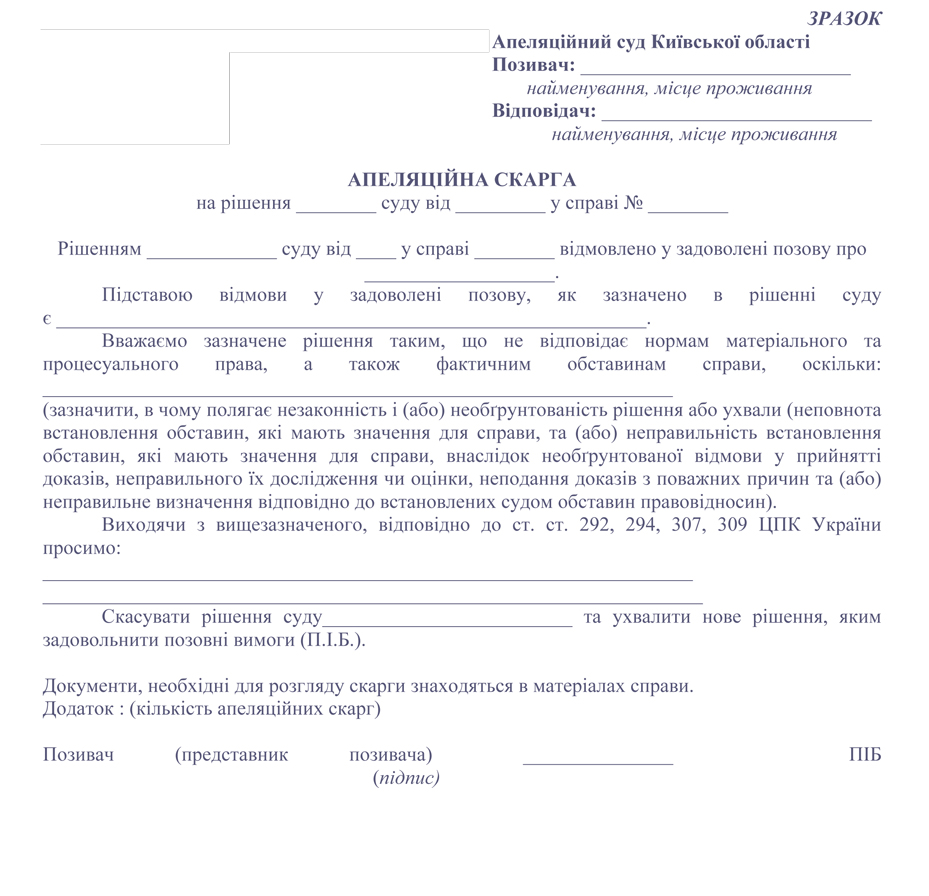Time Limits for Appealing a Court Decision
Appealing court decisions is a very serious matter. To defend your interests in higher courts you need a first-class legal expert. Our company has qualified lawyers on staff who have experience handling cases in all judicial instances. By contacting us, you will always be satisfied with the results of our lawyers’ work.
Appealing court decisions is the legal right of any participant in the judicial process. This procedure makes it possible to reduce the likelihood of judicial errors and significantly increase the efficiency of proceedings. However, despite this, proving your case in higher courts will become increasingly difficult.
According to Ukrainian law, the following persons have the right to file an appeal against a court decision:
- plaintiff – if the court did not grant their claims;
- defendant – if they disagree with the verdict;
- third parties – individuals whose interests are affected by the court’s verdict.
To challenge a court decision, you must prepare a petition for review of the case and submit it to the court, either personally or through an authorized representative. You must have grounds for filing the complaint: arguments that the verdict is illegal or unfounded. A court fee must be paid for filing the claim.
Unfortunately, the court of first instance, or in other words the local court, cannot always satisfy the plaintiff’s claims. Another situation may occur: the plaintiff’s claims are granted, but the defendant completely disagrees. In such a case, the plaintiff or defendant in a particular case can appeal the local court’s decision in the appellate and cassation proceedings.
An appeal should be filed with the court of first instance. If you disagree with the decision of the district or city court that considered the case, file a written appeal through its registry, but address it to the appellate court.
In the appeal, indicate which parts of the court decision you disagree with, be sure to substantiate the claim and formulate the requests to the appellate court.
An appeal can be filed within 10 days from the date of the decision. If the trial was held in your absence — from the date of official delivery of the court decision.
Those who have missed the deadline for filing an appeal must petition for an extension of the appeal period. It is important to justify the reasons why the appeal was not filed on time. Ignorance of the appeal deadlines does not provide grounds to contest a court decision.
To file an appeal with the appellate court, the applicant must meet the deadline for such action. If this period is missed, the applicant will be deprived of the right to challenge the decision of the court of first instance. It should be borne in mind that, as a rule, a citizen cannot skip the appellate instance and immediately file a cassation complaint. That is, if you missed the time for filing an appeal, you simply cannot proceed further. However, there are exceptions: in some cases a qualified lawyer can prove that the deadline was missed for valid reasons, and it may be reinstated.
One more important point: appeals are carried out only within the framework of previously established circumstances. If it is found in the appellate, cassation instance, or the Supreme Court that the court of first instance did not take into account circumstances that are of substantial importance, the case may be returned for a new hearing.
The court issues two types of rulings in civil cases:
- decision – granting or denying the claims of a civil suit;
- ruling – concerning the procedure of hearing a civil case.
Any decisions can be overturned on appeal. The plaintiff can challenge the dismissal of claims, and the defendant can challenge the granting of a claim. There are limitations regarding rulings: not all types can be appealed.
An appeal can be filed if the client disagrees with the court’s decision and there are substantial arguments:
- the court did not consider the presented evidence or failed to refute it;
- the court relied on the other party’s arguments without taking the facts into account;
- the circumstances of the case were not correctly established;
- the decision violates specific provisions of the law;
- not all claims were satisfied;
- the law was applied incorrectly.
The decision of the court of first instance does not enter into force if an appeal has been filed and proceedings have been opened.
Company Advantages
- full legal support: from drafting and filing the appeal to monitoring the enforcement of the decision;
- experienced specialists will plan and implement a courtroom strategy in advance and be able to choose the position most favorable to the client’s interests;
- we provide consultations regarding case proceedings;
- the cost of services takes into account the specific situation, conditions and complexity of the matter.
The Nakaz law firm will help draft an appeal that the court will not be able to dismiss. A well-drafted claim and effective advocacy in court are half the success on the way to satisfying your claims.
- Drafting a cassation appeal
- Attorney/lawyer participation in court hearings
- Filing documents with the court
- Oral consultation on the case


